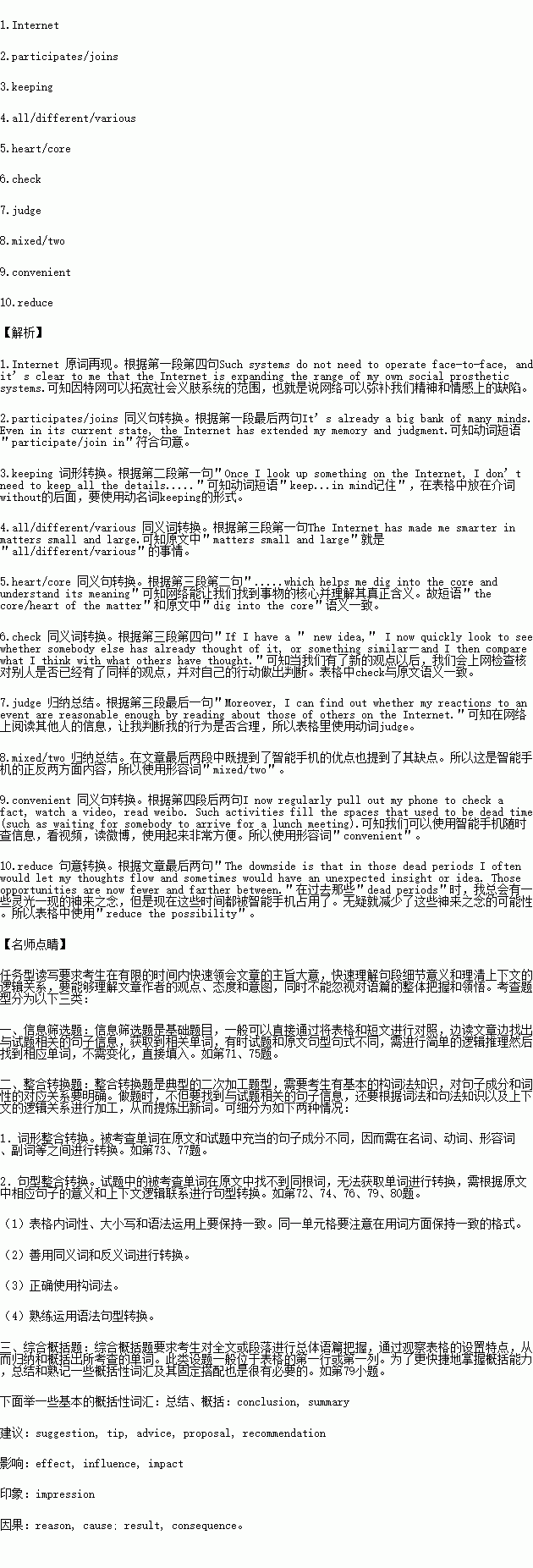题目内容
任务型阅读
请阅读下面短文,并根据所读内容在文章后表格中的空格里填入一个最恰当的单词。
注意:请将答案写在答题卡上相应题号的横线上。每个空格只填一个单词。
An Extension of the Human Brain
Other people can help us compensate for our mental and emotional deficiencies (欠缺),much as a wooden leg can compensate for a physical deficiency. To be exact, other people can extend our intelligence and help us understand and adjust our emotions. When another person helps us in such ways, he or she is participating in what I’ve called a "social prosthetic (义肢的)system." Such systems do not need to operate face-to-face, and it’s clear to me that the Internet is expanding the range of my own social prosthetic systems. It’s already a big bank of many minds. Even in its current state, the Internet has extended my memory and judgment.
Regarding memory: Once I look up something on the Internet, I don’t need to keep all the details for future use—I know where to find that information again and can quickly and easily do so. More generally, the Internet functions as if it were my memory. This function of the Internet is particularly striking when I’m writing; I’m no longer comfortable writing if I’m not connected to the Internet. It’s become natural to check facts as I write, taking a minute or two to dip into PubMed, Wikipedia, or other websites.
Regarding judgment: The Internet has made me smarter in matters small and large. For example, when I’m writing a textbook, it has become second nature to check a dozen definitions of a key term, which helps me dig into the core and understand its meaning. But more than that, I now regularly compare my views with those of many others. If I have a "new idea," I now quickly look to see whether somebody else has already thought of it, or something similar—and I then compare what I think with what others have thought. This certainly makes my own views clearer. Moreover, I can find out whether my reactions to an event are reasonable enough by reading about those of others on the Internet.
These effects of the Internet have become even more striking since I’ve begun using a smartphone. I now regularly pull out my phone to check a fact, watch a video, read weibo. Such activities fill the spaces that used to be dead time (such as waiting for somebody to arrive for a lunch meeting).
But that’s the upside (好处). The downside is that in those dead periods I often would let my thoughts flow and sometimes would have an unexpected insight or idea. Those opportunities are now fewer and farther between.
An Extension of the Human Brain | |
A prosthetic nature | ●The 1. can help make up for our mental and emotional deficiencies as a wooden leg can compensate for a bodily deficiency. ●It 2. in our daily events, extending our intelligence, comprehending our feelings, and expanding the range of social activities. |
Wonderful aspects: memory and judgment | ●On the Internet, we could quickly and easily locate the details, and check facts, without 3. them in mind. |
●The Internet makes us smarter over 4. kinds of things. It provides a dozen definitions of a key term for us to find the 5. of the matter. ●The Internet enables us to exchange ideas with many others to 6. our claims, and to 7. our actions. | |
The 8. sides of smartphones | ●Smartphones make it easier and more 9. to check reality, watch video clips, read weibo. |
●Smartphones 10. the possibility for new and insightful minds, and steal away our dead time. | |

